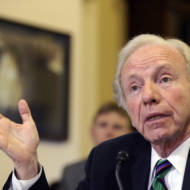
Fifteen years after the September 11, 2001 terror attacks, American political leaders have forgotten about the role Iran played in the atrocity, former Democratic senator Joseph Lieberman wrote in a Wall Street Journal op-ed Wednesday.
The 9/11 Commission found that “there is strong evidence that Iran facilitated the transit of al Qaeda members into and out of Afghanistan before 9/11, and that some of these were future 9/11 hijackers.” However, Lieberman argued, Iran “has never been held responsible for its enabling role.”
Iran’s alliance with al-Qaeda may seem unusual, given that Iran is Shiite and al-Qaeda is Sunni. But despite this theological divergence, Iran has shown that it is willing “to work with extremists of the Sunni sect in the Arab world and elsewhere—even though it views itself as the vanguard of the world’s Shiite community.”
The alliance between al-Qaeda and Iran, which the State Department designates as the world’s leading state sponsor of terror, began in the 1990s, when the leadership of the fledgling terror organization, including Osama bin Laden, then based in Sudan, was introduced to an Iranian envoy who, according to one researcher, “had access to the highest echelons of power in Tehran.”
After this initial contact, the two sides “reached an informal agreement to cooperate, with Iran providing critical explosives, intelligence, and security training to bin Laden’s organization,” Matthew Levitt and Michael Jacobson of the Washington Institute for Near East Policy wrote in 2009. Given that Iran’s Islamic Revolutionary Guard Corps (IRGC) was already providing financial and logistical support to Hezbollah, it was well-positioned to do the same for al-Qaeda.
Iran’s support gave al-Qaeda the ability to strike globally, including against U.S. interests. A U.S. District Court found in 2011 that al-Qaeda’s 1998 attacks on the American embassies in Tanzania and Kenya were the result of Iranian training.
Following 9/11, several al-Qaeda terrorists found a safe haven in Iran, including Saif al-Adel, al-Qaeda’s military chief. The Islamic Republic often claimed that these terrorists were under house arrest. However, “Iran regularly granted the terrorists freedom to move within Iran and to cross into Iraq and Afghanistan to carry out attacks,” Lieberman observed. The terrorists who carried out the deadly attacks in Riyadh, Saudi Arabia in 2003 and the American embassy in Yemen in 2008 started from their base in Iran.
A 2007 letter from bin Laden, which was made public earlier this year, ordered al-Qaeda not to attack Iran, since the country is “our main artery for funds, personnel, and communication, as well as the matter of hostages.”
In 2011, the U.S. Treasury Department designated six al-Qaeda members who were operating within the framework of an agreement between the terror organization and the Iranian government. The Treasury accused Iran of “forging an alliance with al Qaeda in a pact that allows the terrorist group to use Iranian soil as a transit point for moving money, arms and fighters to its bases in Pakistan and Afghanistan,” as the Wall Street Journal described. David S. Cohen, then-under secretary of the Treasury for terrorism and financial intelligence and currently the deputy director of the CIA, announced at the time, “By exposing Iran’s secret deal with al-Qa’ida allowing it to funnel funds and operatives through its territory, we are illuminating yet another aspect of Iran’s unmatched support for terrorism.”
The Iran-al-Qaeda alliance continues today, Lieberman noted; the Treasury sanctioned two Iran-based al-Qaeda leaders this past July.
Despite these ties to al-Qaeda, not to mention other terrorist groups, “Washington policy makers have pursued closer relations with Tehran,” Lieberman observed. “In the years following reports, court rulings and U.S. government findings exposing the Iran-al Qaeda alliance, the U.S. led the countries known as the P5+1 in making a deal with Iran that at best postpones Iran’s nuclear ambitions—while giving them billions of dollars now, and a legal path to nuclear weapons in the future.”
Lieberman concluded:
We negotiated with our enemy, the Iranian regime, notwithstanding its declared and demonstrated desire to destroy our country.
On the 15th anniversary of 9/11, the U.S. should not be rewarding Iran for its deadly actions with gifts of sanctions relief, and the easing of arms embargoes and ballistic-missile restrictions. It is time to hold the regime accountable for its reckless aggression and support of terrorism.
By: TheTower.org
Do You Love Israel? Show Your Support!
Want to do something important for Israel? Make a donation to United with Israel, and help to educate and inspire millions around the world to support Israel too!
Now more than ever, Israel needs your help to fight the battle of public opinion. Israel’s enemies are using social media to incite brutal terror against innocent civilians. We need your help to fight back.
Help defend the truth about Israel to millions of people around the world. UWI also contributes to vital charity causes like building bomb shelters to protect Israeli citizens. Please show your support today!
Source: United with Israel

